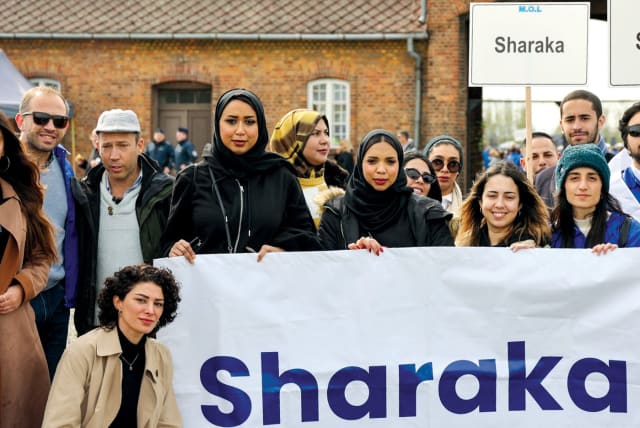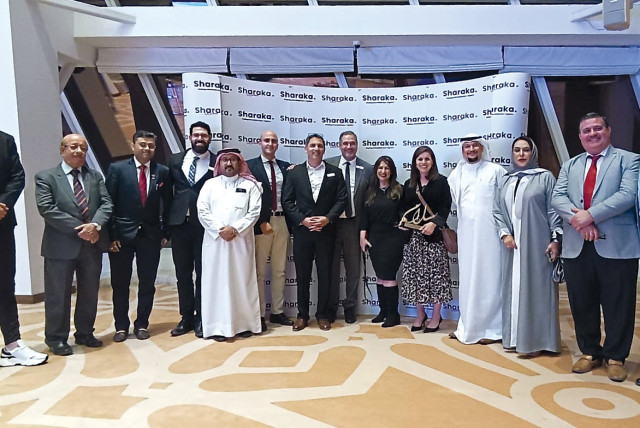Arab influencers embrace March of Living, welcomed by attendees

Sharaka brings a delegation of Arab influencers to the Holocaust commemoration ceremony
It was only a few years ago when the mere sight of a Jew caused Rawan Osman to spiral into a panic attack.
When the young student from Lebanon relocated for her studies to the Jewish Quarter in Strasburg, France, she figured that like the Jewish Quarters she had encountered in the Middle East, the name was an homage to the Jewish communities of the past, where most traces of Jewish life had been eradicated due to pogroms and antisemitism.
This was a relief. As someone who had family members affiliated with Hezbollah, she was taught from birth that the last person you’d want for a neighbor was a Jew.
However, in Europe, this particular Jewish Quarter was different.
Imagine her surprise and horror when she entered the local grocery store and saw men in black hats casually shopping around her. She immediately started breathing heavily and, with sweaty palms, dropped her groceries and went back home.
A few minutes later, she decided to collect herself — she did need those groceries after all — and cautiously entered the store.
When she locked eyes with the grocer, he didn’t mock her for her outburst. Instead, she was met with kindness.
What would usually be an inconsequential interaction set Osman on a path of wanting to find out more about Jewish life. That journey, where she is now writing a book about Jewish and Islamic studies, led her to understand that what she had been taught her whole life was a lie.
“In hindsight, I understand that my reaction was not only misguided but also bigoted. However, that is how I was conditioned to react to a Jew,” she said. “I was told they were scary, dangerous and not to be trusted. And after going through three wars in Lebanon where the state told me that Israel was the aggressor, my feelings not only felt justified; they were encouraged.”
Arabs take part in the March of the Living from Auschwitz to Birkenau
Osman spoke to The Jerusalem Report shortly after her participation in March of the Living, the annual three-mile trek from Auschwitz to Birkenau.
There, she was a guest of Sharaka, a non-governmental initiative that cultivates people-to-people relationships from Arab countries that reached normalization agreements with Israel as part of the Abraham Accords.
Osman, along with 21 other participants from Morocco, Bahrain, Turkey, Syria, Lebanon and Algeria, together with Israeli Arabs, arrived as part of the organization’s Tolerance Program. The program encourages participants to engage in a series of in-person and online lectures and conversations about the Holocaust (including the efforts of Muslims who saved Jews), antisemitism and all forms of extremism, genocide in modern history, sources of moderation within Islam, and what they can do in their societies to promote tolerance. The program is conducted with the assistance of the Conference on Jewish Material Claims Against Germany (Claims Conference), which is sponsored by the foundation Remembrance, Responsibility and Future and supported by the German Federal Ministry of Finance.
Seeing men and women of Arab descent tour the somber grounds and pay their respect to the lives lost was something many Jews didn’t realize they needed to see. But once they saw a delegation there who acknowledged the most painful period of Jewish history, it didn’t take long for the tears to start flowing.
“Dozens came up to us and with tears in their eyes and said how grateful they were to see Arabs acknowledge — and not dismiss — their suffering,” said Fatema Al Harabi, a participant from Bahrain.
Dan Feferman, executive director of Sharaka, was one of the many attendees at March of the Living who found comfort in the embrace of Arabs.
Last year, the first time Sharaka brought an Arab delegation to the ceremony, he recalled being comforted by one of the participants as he wept.
Today, a year later, he still thinks about that moment and how it not only uplifted him personally but also transformed that participant into an ambassador of change when he returned to his home country.
“Before attending the march, he may never have spent much time thinking about the six million who perished in the Holocaust, unlike most Jews who have that figure emblazoned on their psyche. But in that moment, his empathy for our tragedy demonstrated that in sadness there is unity,” Feferman said.
Their participation at Auschwitz serves a much greater goal than simply bringing diversity to the ceremony, however,
Amit Deri, co-founder of Shraka, explained that the delegation came hungry for information. “They arrived at the march eager to not only learn but also to experience firsthand the foundational piece of history and humanity that their nations had denied them for so long,” he said.
“The Arab delegation’s participation in March of the Living sends a signal of immense hope — that through symbolic acts and educational programs, even a relatively small group of Arab individuals have the capability to leverage their influence and to start shifting the conversation in their societies around extremism, discrimination, and antisemitism,” he added.
The Abraham Accords have already begun this encouraging process.
As for Osman, she is optimistic that despite the bad blood between Israel and several of its neighboring Arab countries, peace is still possible. After all, if Germany and Israel can come to an understanding, why can’t Arab countries follow suit?
“Some 80 years ago, Jews were considered subhuman in Germany and paid a heavy price. It’s shocking to know that one of the most educated countries in the world was home to the masterminds of one of the most brutal genocides in human history,” she said. “Yet today, Germany and Israel enjoy a positive relationship in which they cooperate on an array of initiatives, ranging from education to culture to security. If Germany and the Jewish community can make peace, I firmly believe that Jews and Arabs can continue to do the same.”
The first step to forging peace, though, is being empathetic toward one another and recognizing the ways history has wronged the other side. Bringing an Arab delegation to the horrific sites of torture and starvation is one way to do that.
As such, the delegation participants are “well positioned as torchbearers of truth in Arab societies,” Deri said.
In a region rife with Holocaust denial and minimalism, this is a critical component toward building solidarity between Jews and Arabs.
“Sharaka’s approach is effective because it leverages government attempts at normalization to reach out to people on the ground — people who believe that Arabs and Jews have been at odds for far too long; people who embrace the fact that a new chapter is upon us,” Al Harabi said. “It’s a stark reality check that this new chapter is marked by something as catastrophic as the Holocaust. But if we can start lifting each other during times of sadness, it shouldn’t take too long before we exult together in times of joy.” ■
Jerusalem Post Store
`; document.getElementById("linkPremium").innerHTML = cont; var divWithLink = document.getElementById("premium-link"); if (divWithLink !== null && divWithLink !== 'undefined') { divWithLink.style.border = "solid 1px #cb0f3e"; divWithLink.style.textAlign = "center"; divWithLink.style.marginBottom = "15px"; divWithLink.style.marginTop = "15px"; divWithLink.style.width = "100%"; divWithLink.style.backgroundColor = "#122952"; divWithLink.style.color = "#ffffff"; divWithLink.style.lineHeight = "1.5"; } } (function (v, i) { });

